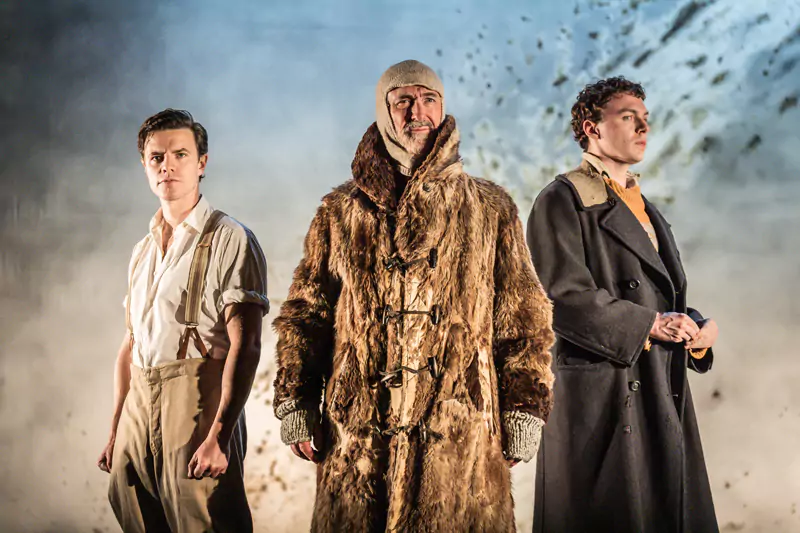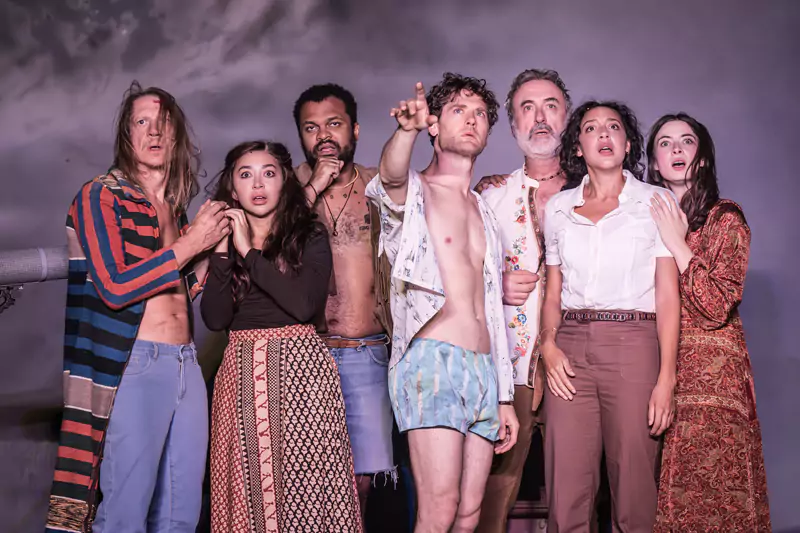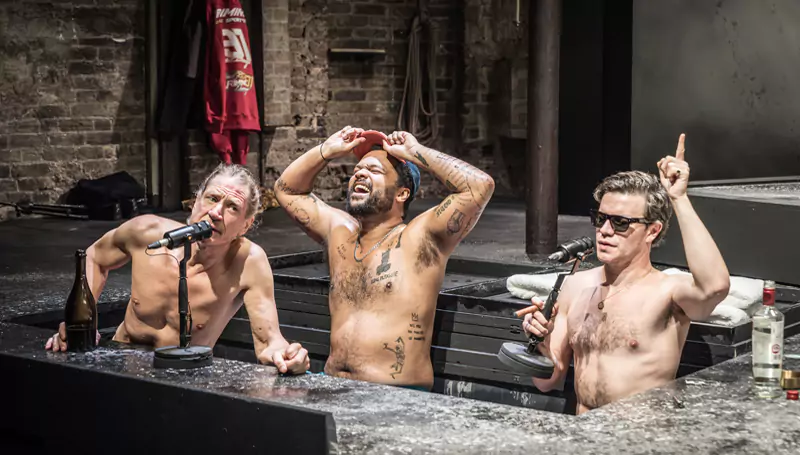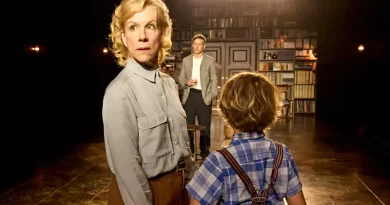“Romans: A Novel” at the Almeida Theatre
Jane Edwardes in North London
19 September 2025
★★★
Alice Birch’s new work intrigues before one even enters the theatre. The writer of [BLANK] and Anatomy of a Suicide for the theatre, and adaptor of Normal People for TV and Lady Macbeth for the cinema, has come up with a teasing title. How can a play claim to be a novel? Surely, there is a fundamental difference between the individual experience of reading a book, and the group experience of watching a play? Secondly, there’s Birch’s comment in a pre-show interview that she chose to write about masculinity after she was criticized for writing too superficially about men in her previous work. That’s a brave way of tackling a supposed weakness.

Oliver Johnstone, Declan Conlon and Stuart Thompson.
Photo credit: Marc Brenner.
The result is a hugely ambitious piece, steeped in cultural and political references, that is in turn troubling, exasperating, provocative, and entertaining. It turns out that the titular reference to the novel refers to the way in which Birch experiments with form from the naturalism of the 19th-century novel, through modernism, postmodernism, and, finally, metamodernism. Without being told, the latter two would be hard to identify.
It is the tale of three Roman brothers – note the surname and its reference to a people who valued the masculine virtues of courage, discipline, and stoicism – who are born in the 19th century. But rather like Virginia Woolf’s Orlando, they live through several eras, without ageing very much, right up until today.
Kyle Stoller plays Jack, seen initially as a 10-year-old boy. His first words set the scene: ‘My father wanted only sons but he had to get through four dead daughters before he got to the sons, but at least the sons lived.’ Ignoring the screams of his mother as she gives birth to her third son, Edmund, Jack secretly meets his Uncle John, a military man who hands him a gun and introduces him to the adrenalin rush of staring at death in another man’s face. Jack goes on to have a varied life as a soldier, explorer, mountaineer, writer, and cult leader.
In fact, it is the death of the mother that destroys the family. Jack’s father takes to drink and weeping in the street. Jack and his brother Marlow are sent to boarding school where, in a scene that even Dickens might feel was over the top, the headmaster physically punishes one boy for the failings of the other. As is so often the case, Marlow’s response to these beatings is to become a sadist himself. Oliver Johnstone as Marlow embodies his cool sense of entitlement as he travels to South America in search of rubber and minerals, brutally exploits the local people, and returns a very wealthy man.
When Jack comes home from the army, he is shocked to discover that Edmund is wearing a dress and almost certainly being abused by his father (the trigger warnings for this production are extensive). Edmund (Stuart Thompson) is a lost soul. Exhorted by his brothers to make something of himself Jordan Peterson-style, he invariably replies, ‘I do not know that I have the pieces.’ His arrest for murder and subsequent exoneration inspires Jack to write a novel that becomes a cause célèbre and sees him join the list of Great White Authors, whose opinions are sought on all kinds of topics.

Photo credit: Marc Brenner.
Women do appear later in the play but are firmly kept in their place. Jack marries another writer, but when she cracks up, she is shipped off to a sanatorium and her reputation trashed. There’s a suggestion that violence is part of Marlow’s appeal. His wife lives a life of luxury and provides her husband with a whole tribe of children, while tolerating Marlow’s infidelities as he fathers further children all over the globe. Women are also part of Jack’s entourage when he sets up a hippie, drug-taking community where the women submit to his every whim, and mock the female documentary maker who dares to ask searching questions. Finally, there’s Jack’s daughter, who confronts him face to face and attempts to get behind his fluent and meaningless apologies. That is one of the most compelling scenes in which Agnes O’Casey is highly impressive as the daughter, rather undermined by other events that are happening onstage at the same time.
As time moves on, the scenes become increasingly intertwined, helped by a revolving stage, which is part of Merle Hensel’s dour set. Birch’s play is enormously helped by the first-rate cast that director Sam Pritchard has put together. Stoller (so impressive in The Inheritance) as Jack is sometimes impassive, but always appears alert to what others are thinking. Johnstone as Marlow becomes increasingly assertive as he embraces the notion of male supremacy, while Thompson’s Edmund adds some much-needed irony and quirkiness.
The play is hugely ambitious; the writing impressive with flashes of black humour; the form sometimes exasperating but never boring. The underlying premise, however, feels inadequate. Birch draws a strong line between Victorian culture and toxic masculinity today. Brutalized men are responsible for today’s brutal society. But while Jordan Peterson, Andrew Tate, and the MAGA movement are all extremely disturbing, what defines them is surely their sense of grievance as they feel their power dwindling, and that what they see as men’s innate superiority is no longer recognized. Corporal punishment, empire, and military might are a fading part of the picture. Consequently, the nihilism of the ending feels at odds with reality.









